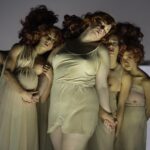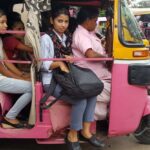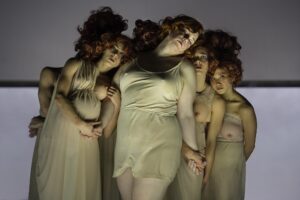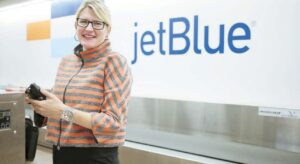
Freshly minted college graduates, having brunch and Bloody Mary’s one day in New York City, childhood best friends Emma Bee Bernstein and Nona Willis Aronowitz concocted a plan to get out of their intellectual, liberal, urban bubble to find out what feminism in America means to women in the new millennium.
“We just had this wanderlust that we had to quench and it was really so connected with feminism,” says Nona, 27, writer, editor, author and co-founder of Tomorrow Magazine, who set out with Emma, when they were both 23-years old, to explore women’s attitudes about where women stand in the new millennium and what feminism means today.
They blogged their journey that became the book Girldrive: Criss-Crossing America, Redefining Feminism.
What does the wide open road have to do with feminism? Feminism, much like road trips, are about self-discovery and grasping the sense of self, Nona points out.
On the road
The trip was as much about discovering themselves being way out of their element – the city girls had to learn how to change tires and to talk mechanics – as it was discovering their country.
“The actual road trip itself was so amazing,” says Nona about times when the friends were intellectually exhausted, but suddenly revitalized stopping somewhere in the mountains and looking out on a breathtaking view. “You realize how beautiful this country is and you get swept up in being out of your normal surroundings.”

Born and raised feminists – Nona’s mother, the late Ellen Willis, a well-known feminist writer – the girls, then both 23 years old, embraced an American right-of-passage and decided to hit the open road like Jack Kerouac and Neal Cassady girl-style.
Teched up with a BlackBerry, camera, and laptop the girls set out in Nona’s Chevy Cavalier in 2007 with an estimated $4,000 each the girls saved up for the trip. For three months they traveled to 25 cities logging 12,000 miles and interviewed 250 women.
“We were the ones having those freewheeling conversations. We were the ones drinking, smoking pot, pontificating, just like hanging out and having fun and being a little reckless,” says Nona, revising the girlfriend road trip from running away from the bad boyfriends and the law a la “Boys on the Side” and “Thelma and Louise” to finding feminism and themselves.
Unfortunately, Emma, who was an artist, committed suicide in Italy, before the book was completed.
Feminism 4.0
The girls simply wanted to wash that generational tension right out of the waves of feminism, get it out of the corner it had been bullied into by the cultural and media backlash and its own unruliness, and push the feminist conversation forward.
Building the bridge, Emma and Nona interviewed women old and young from Christian and conservative to queer and liberal, wealthy to working class, in cities and small towns across the United States.
Still the girls had their doubts. When they first set out on their adventure they didn’t think that they could relate to the variety of women they interviewed.
“We never thought that we could relate to Christian women. We never thought that we could relate to conservative women. We didn’t even really think that we could relate to women from small towns,” says Nona, who came away from the journey with a sense of the great communication divide between conservatives and liberals.
“I know it sounds idealistic, it just feels so unproductive to stay in your own circle, even if it feels spiritually better to talk to people who agree with you,” says Nona, who doesn’t feel like her feminist principles were compromised or changed much in spite of the eye opening experience.
“Our minds were smaller when we first left for the trip,” she says. But by the end of the journey she found, “Our minds just became open and we started actually talking about these issues and how we could find common ground.”
Identifying and understanding that sometimes the word “feminism” can be a bit freaky, Nona, doesn’t care if “somebody labels themselves as a feminist, just as long as they have a gender consciousness,” she continues, pointing out that not only are women’s lives are very complex and complicated.
What’s dangerous is that the ideology and theory gets trapped in the ivory towers and isn’t trickling down to everyday life.
 “Feminism is as much action as it is thinking,” adds Nona, pointing out that it’s dangerous “if feminism just lives in academia.”
“Feminism is as much action as it is thinking,” adds Nona, pointing out that it’s dangerous “if feminism just lives in academia.”
She’s also found that Girldrive has opened the road to a deeper understanding of feminism for other women.
“I thought I understood about feminism,” she says, about one reader’s response. “Now, I realize there is so much more to be learned and so many perspectives to be considered and that’s awesome.”
To contract an original article, purchase reprints or become a media partner, contact ">editor [@] girlsthatroam [.] com.







